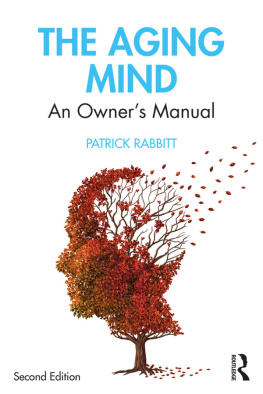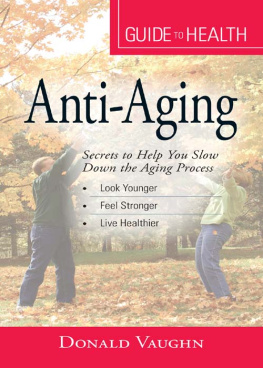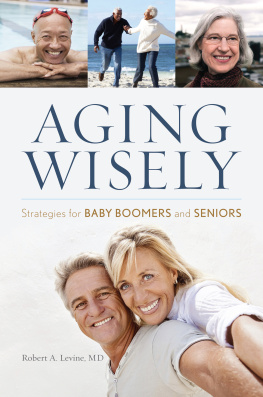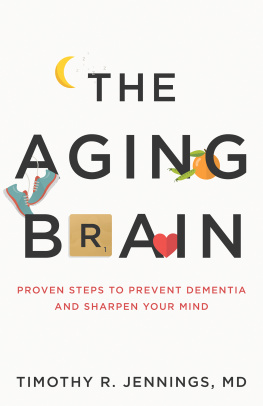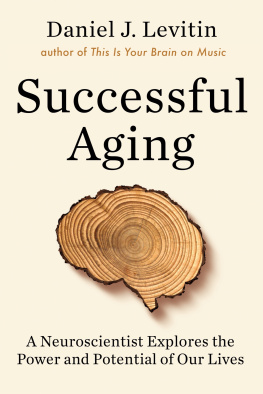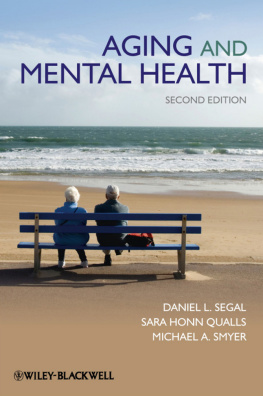
THE AGING MIND
The Aging Mind offers an accessible introduction to what research has revealed about how our bodies and brains age and how these changes affect our everyday experiences and lives. This second edition is fully updated with contemporary studies and neuroscientific findings, to offer an engaging exploration of 25 facets of the physical and mental aging processes.
Written by eminent gerontologist Patrick Rabbitt, who interprets research through his own personal daily experiences, it explores what aging really is and how to accept and manage it. It explores why our sensory and cognitive experiences change as we get older and what these developments mean for our overall physical and emotional well-being. Key topics explored include memory, intelligence, attention, sleep, vision and hearing, taste and smell, touch and balance, anxiety, depression and perception of the passage of time. It also discusses how far we can keep and develop the skills we have mastered over our lifetimes.
The Aging Mind debunks unhelpful myths about the aging process and offers guidance on how we can age better, allowing us to continue to manage and enjoy our lives. This second edition is invaluable for students and researchers of cognitive gerontology, for professionals working with clients experiencing issues around aging and for all those interested in understanding their own, or their relatives, aging.
Patrick Rabbitt worked for the Medical Research Council Applied Psychology Research Unit, Cambridge, UK (19621967); the University of Oxford, UK, as a lecturer in psychology (19681982); the University of Durham, UK, as Professor of Psychology and Head of Department in (19821983); and the University of Manchester, UK, in the Research Chair in Gerontology and Cognitive Psychology and Director of the Age and Cognitive Performance Research Centre (19832004). He is currently Associated Researcher at the Department of Experimental Psychology, University of Oxford, UK.
THE AGING MIND
An Owners Manual
Second Edition
Patrick Rabbitt

Second edition published 2020
by Routledge
2 Park Square, Milton Park, Abingdon, Oxon, OX14 4RN
and by Routledge
52 Vanderbilt Avenue, New York, NY 10017
Routledge is an imprint of the Taylor & Francis Group, an informa business
2020 Patrick Rabbitt
The right of Patrick Rabbitt to be identified as author of this work has been asserted by him in accordance with sections 77 and 78 of the Copyright, Designs and Patents Act 1988.
All rights reserved. No part of this book may be reprinted or reproduced or utilised in any form or by any electronic, mechanical, or other means, now known or hereafter invented, including photocopying and recording, or in any information storage or retrieval system, without permission in writing from the publishers.
Trademark notice : Product or corporate names may be trademarks or registered trademarks, and are used only for identification and explanation without intent to infringe.
First edition published by Routledge 2014
British Library Cataloguing-in-Publication Data
A catalogue record for this book is available from the British Library
Library of Congress Cataloging-in-Publication Data
A catalog record has been requested for this book
ISBN: 978-1-138-49051-2 (hbk)
ISBN: 978-1-138-49053-6 (pbk)
ISBN: 978-1-351-03522-4 (ebk)
Typeset in Bembo
by Swales & Willis Ltd, Exeter, Devon, UK
I began to research aging in 1959, when I was 25, and have happily carried on for the next 60 years. Since then, I have probably thought about aging every day. In Cambridge and then in Oxford, I made many small experiments to find out how and why older people become slow at making simple decisions. In Manchester and Newcastle, my colleagues and I spent 20 years following over 6500 remarkable volunteers who, when we first saw them, were aged from 52 to 92. This taught us about how age affects peoples brains and so their abilities and their minds. Now I am older than most of these kind and gallant people were when I first met them, and it is amusing to recognise the changes that my colleagues and I detected in them appearing in my own everyday life and lapses and shaping my daily experience of life and my idea of who I am as I still trundle about. There is also contentment in finding that the work that my colleagues and I have done is useful not because it shows that there are things that we can no longer do as well as we once did but because it highlights things that we can still be good at and confirms that we can still learn new things even if we must now try harder to do this. Everybody knows that, in general, our mental abilities change in old age in ways that we deeply resent and so do not like to think about. This means that an account of these changes may be misinterpreted as a scary catalogue of diverse dooms that we all must face if we live long enough. The better story is that the more closely we study age changes the better we recognise how slight they are, how gradually they progress and what are the best steps that we can take to cope with them.
In this respect, the message from cognitive gerontology is the same as from all other sciences. The universe that we live in is the only one we can know. It is irrelevant whether we like it or not, and it is only by doing our best to understand precisely what is going on that we can hope to change bits of it enough to make the only life that we have more comfortable. What we find out about our situation is not always comforting, but there is always interest, excitement and dignity in understanding it as clearly as we can.
Many young people do not truly believe that they will grow old and turn conversations away from this grey area to anything more congenial. Because it is likely that young readers will be undergraduates, graduate students and health professionals who need a coursebook in cognitive gerontology, chapters are referenced to allow them to explore topics further for academic or professional reasons. Since students will read this book for these practical purposes, I need not apologise to them for providing more detail than they may need, but I must beg pardon for how I have set this out. I have tried my best to be as accurate and comprehensive as I should, but I found that I simply could not bear to write yet another textbook. So, I have tried to describe not only what we know about mental aging but how we found this out and, more importantly, to give a glimpse of the excitement and the everyday fun and comradeship that makes scientific research the happiest career that I can imagine. I also needed to give myself as much entertainment as possible while writing. Hence, the (mainly lame) jokes. I am sorry if they do not work for you, but they made my task much easier.
Middle-aged people may read this book for different reasons. In their uneasy time of life, many of them desperately want to be told something encouraging: ideal news would be that theirs is the first generation of humans for whom aging and mortality have been indefinitely postponed or, at least, that they personally will be spared the particular changes that they most fear. Of course, most are, quite rightly, far too savvy for breathless optimism. My first offer to them is that I can, after all, offer some good news: the changes they will experience are far smaller and more gradual than they probably imagine, and there are very simple ways to slow them and to reduce their effects on our lives. Although most of the changes I describe are hardly detectable in middle age, it may help, at that uneasy point in life, to have a map of the territory ahead and to plan the journey to come. Middle age is also a time when parents and older family and friends become an issue. To be the most help to them that we can, we must try to understand what they are experiencing and, especially, to grasp that most of their problems have many different causes and consequences. Better comprehension of what is happening really does calm irritation and worry, allow more insightful and so more affectionate relationships and encourage more effective and compassionate care. I have never understood why many people mistake attempts at scientific objectivity for cold indifference. This is certainly not true of medics or of cognitive gerontologists who do care very much and want to do the best they can to help but realise that they have no chance of being useful unless they can find out, and explain, the way things are.
Next page
